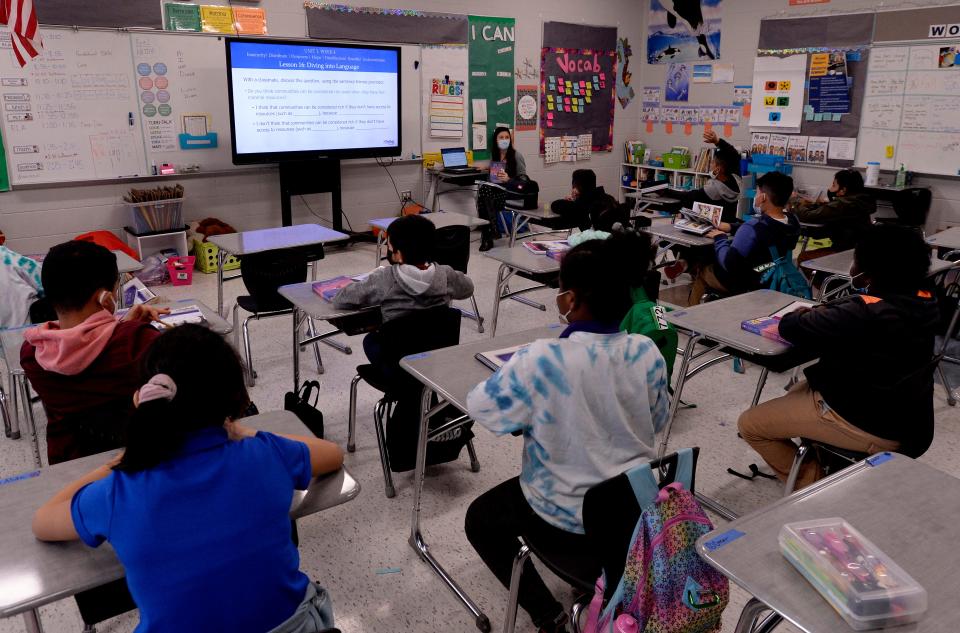Nashville School Board should pass resolutions and policy that advance equity | Opinion
Let’s talk about public education progress and equity. The Tennessean reported that Metro Nashville Public Schools have improved on Tennessee Comprehensive Assessment Program (TCAP) scores and that our students made greater progress than the state average.
NOAH (Nashville Organized for Action and Hope) applauds the positive steps Dr Battle and her team have taken.
But is it equitable?
The district’s Equity Roadmap defines equity as when “Every student receives what they need, when they need it, to develop to their full academic and social potential regardless of their race, nationality, gender, sexual orientation, disability, ethnicity, language, religion, family background, or family income.” Every student.
Hear more Tennessee Voices: Get the weekly opinion newsletter for insightful and thought provoking columns.
Statistics shows grave inequities
But, in the 2021-22 school year Black students in MNPS were two times less likely than white students to be enrolled in gifted and talented education.
And Black students were 3.2 times more likely than white students to be suspended.
And high schools that serve mostly Black students have among the fewest early post-secondary opportunities (EPSOs), such as advanced placement and dual enrollment courses.
And the MNPS school board does not have a comprehensive equity policy in place. NOAH is part of a school board ad-hoc committee currently drafting a policy.
Dismissed: The Tennessean's series on Metro Nashville Public Schools
And there is too little reporting of data to the public about equity along many metrics.
Though the Equity Roadmap laudably defines the goal, achieving equity is a task that’s only just begun. It requires involving the community, measuring progress, acknowledging weaknesses, and, importantly, making the results public.
Equity requires identifying gaps, barriers, and missed opportunities so they can be addressed. Which schools have made progress? Which schools need more help? Will predominantly Black schools get as many AP or dual enrollment courses as racially diverse schools?
Will they get the support staff students need to succeed? Equity requires input from parents, students, and the community.

Sign up for Black Tennessee Voices newsletter: Read compelling columns by Black writers from across Tennessee.
Who is NOAH?
NOAH (Nashville Organized for Action and Hope) is an anti-racist faith-based coalition made up of 62 congregations, community organizations, and labor unions.
NOAH amplifies the voice and the power of ordinary people.
Our Education Task Force works to advance Black education and develop Black successes, and we have established strong relationships with school leaders.
Sign up for Latino Tennessee Voices newsletter: Read compelling stories for and with the Latino community in Tennessee.
What does NOAH want now?
NOAH wants the MNPS School Board to adopt an equity policy that addresses all aspects of the district’s work.
NOAH wants the board to commit to providing equitable distribution of resources and opportunities.
NOAH wants the district to set clear, measurable goals for furthering equity for all racial groups and to publicly report district progress toward those goals.
NOAH wants the district to provide professional development to teaching and support staff specifically designed to strengthen knowledge and skills for eliminating gaps in student opportunities and achievement.
NOAH wants MNPS to work with students and families to identify barriers to achievement and opportunities for academic success.
NOAH wants the director of schools to develop plans to ensure equitable access to advanced academics.
What should you do?
As a parent, student, or community member, you should contact your school board member to ask for information or express your opinions, including encouraging their support for board resolutions and policy that advance equity.
You can find your school board member here: https://mnps.org/board-of-education/school-board-districts
A resolution for equity in advanced academics will be on the school board’s Aug. 9 meeting agenda. Mark your calendar and go to this meeting. With your presence, you will boost this step toward equity in our schools.
Kids grow up fast. If we take five years to realize results from the Equity Roadmap, eighth graders will be out of the system by then. So we have to act now, strongly, and together.
The authors are members of the Nashville Organized for Action and Hope (NOAH) Education Task Force. Benita Kaimowitz is a retired educator. Linda D. Robinson and Dr. Bethany Rittle-Johnson are the task force's academics committee co-chairs. Liza Ramage, a retired educator, is the task force chair.
This article originally appeared on Nashville Tennessean: Nashville School Board should pass policy to advance equity
